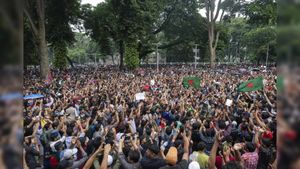The 2025 German federal elections concluded with unexpected results, leaving the political future of the country hanging by a thread. The CDU/CSU emerged as the largest party but faces immense challenges in forming a stable government amid political fragmentation.
On election night, the atmosphere at the Konrad-Adenauer-Haus was charged with tension as the initial projections came through. Friedrich Merz, the CDU's candidate for chancellorship, acknowledged the win but noted it fell short of expectations: "We have won the election," he declared. Yet, with results fluctuated between 28 to 29 percent, jubilation was mixed with concern about securing coalition partners.
Merz expressed urgency, saying, "Germany must become capable of action." This urgency was mirrored by electoral dynamics. The SPD, led by Olaf Scholz, suffered its most disastrous outcome, resulting from dissatisfaction with governance over economic and migration issues, prompting Scholz to announce he would not negotiate on behalf of the SPD.
"The election result is very bitter," Scholz stated, hinting at possible personal consequences but withholding any definitive answers. Christian Lindner, head of the FDP, went as far as to announce his resignation from politics should the party fail to clear the 5% threshold to enter the Bundestag.
Key discussions during the post-election 'Berliner Runde' highlighted the challenges Merz would face, including the exclusion of the far-right AfD from coalition discussions. Stressing unity, Merz categorically denied any collaboration with the AfD, saying, "We will not engage in false politics for this country." Meanwhile, the AfD, with Alice Weidel at the forefront, viewed the results as indicative of public support for their proposed coalition.
Contrastingly, the CDU and the CSU expressed their preferences for partnership, with Merz pushing for potential alliances with the Greens and the SPD, should they prove necessary. "If it takes two partners, it will be more challenging, but it must work," Merz said, acknowledging political realities.
Markus Söder, head of the CSU, emphasized the importance of addressing the German people's discontent. He noted, “We feel the uncertainty among Germans; it is imperative to initiate a political directional change.”
Key electoral analysis revealed the underlying factors influencing the results: high voter engagement driven by vivid public concerns such as economic stability, immigration, and social justice. The election saw CDU/CSU gaining support particularly among older demographics, contrasting sharply with the younger voter base favoring parties like the Linke and AfD.
While the election results underscored widespread disenchantment with the governing coalition, it also highlighted the fragmentation of the political sphere, leading voters to explore alternatives like the newly emerged BSW, which has garnered significant support as well.
Political analysts noted the SPD's historic slump is largely attributed to the perceived inadequacies of the Ampel coalition and the challenges posed by pressing themes of economic security and asylum policies, which saw the SPD struggling for credibility among traditional voters.
Even as the dust settles, the notion of collaboration, especially between the CDU/CSU and SPD, raises eyebrows since the parties held divergent views during the campaign. The backdrop of the campaign has also been defined by polarization—a sentiment echoed by political pundits who observed the stark divides among voters.
"The foundation of support for the SPD has been shaken to its core," stated political scientist Korte during one of the analyses. “Voters are increasingly leaning toward parties they believe address their immediate concerns, which has changed the game for traditional political alignments."
Voter motivations were clear: security, economic stability, and social justice emerged as key factors, with the SPD’s loss of credibility resulting from failures to effectively communicate their policies and responses to the public's concerns.
Looking forward, the timeline for coalition formation remains tight. Both Merz and Söder aim for the government to be operational before the Easter holidays, urging representatives to explore all options swiftly. "It is possible to complete negotiations within eight weeks; with one partner, it might be easier; if two are needed, then the complexity increases," said Merz.
Overall, as Germany stands on the brink of transformation, the next few months promise to be pivotal. With Merz vying for leadership, questions loom about his ability to navigate the treacherous waters of coalition-building, especially with the pressing global issues facing Europe. The message from voters is clear: they demand proactive, effective governance, and the pressure is on Merz to deliver.



